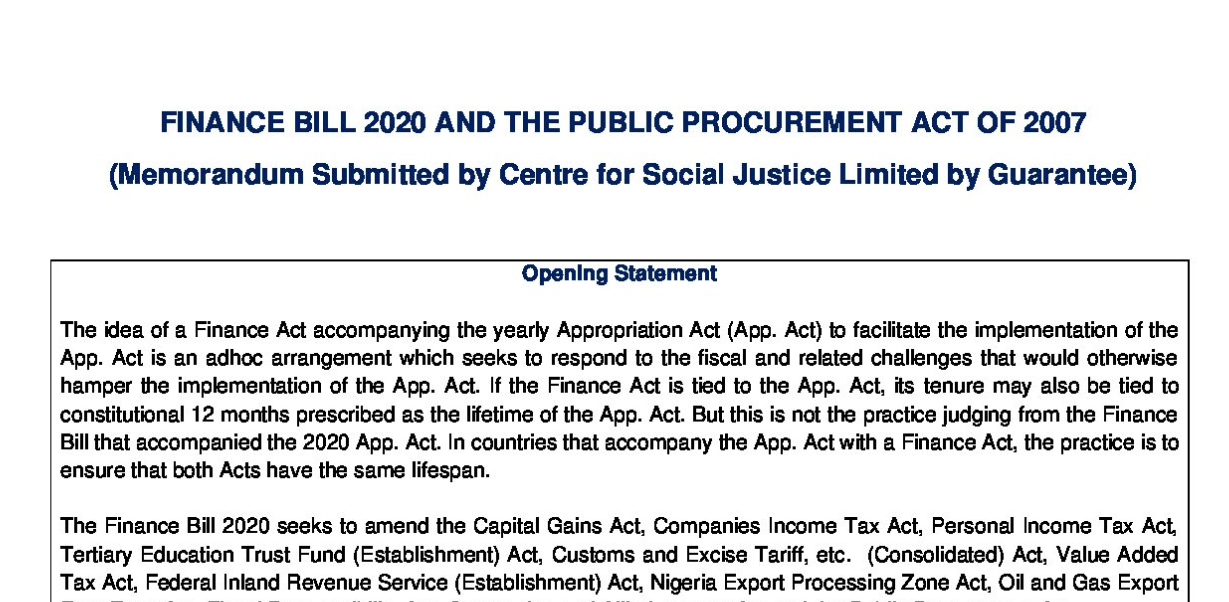News
CSJ criticizes the amendment of 12 Fundamental Economic Acts with just one Bill
Share on facebook
Share on twitter
Share on whatsapp
Share on telegram

The lead director of the Centre for Social Justice, Eze Onyekpere on the Tuesday 15th December 2020, along side other CSJ staff addressed the media on the NGO’s stand on the 2020 finance bill, which was passed by the senate on the 15th of December 2020. The Lead Director in his statement, condemned the move by the National Assembly, describing it as an ambitious attempt to amend 12 Acts with just one bill. The 12 Acts include Capital Gains Act, Companies Income Tax Act, Personal Income Tax Act, Tertiary Education Trust Fund (Establishment) Act, Customs and Excise Tariff, etc. (Consolidated) Act, Value Added Tax Act, Federal Inland Revenue Service (Establishment) Act, Nigeria Export Processing Zone Act, Oil and Gas Export Free Zone Act, Fiscal Responsibility Act, Companies and Allied matters Act and the Public Procurement Act.
The lead director said “It is simply too ambitious to propose to amend 12 Acts of the National Assembly (NASS) with just one Act of 39 pages. The competencies and expertise required to attend to the subjects covered by these laws are too wide to be considered in just one amendment Bill. Furthermore, these laws are too fundamental to our economic management to contemplate amending them in a hurry. They require due contemplation and deep consultation with stakeholders. Their presentation and consideration as single bills should be considered on their merits. Lumping them together serves no useful purpose.”
The Lead Director then went further to advice the other arm of the National Assembly yet to pass the bill to seek the right competences when considering the bill, given its broad scope. Although it took the Senate about 2 weeks to complete the entire process, Mr. Eze advised the other arm of the National Assembly to spend more time on the bill so as to enable them consider all angles, to avoid creating problems for the future.
Mr. Eze went further to criticize some parts of the bill. One of such parts is the increase in the mobilization fee for contracts to thirty percent (30%). He described this move as opening doors for unfinished contracts to thrive since most contracts have a profit margin of less than 30%. He said this move will encourage contractors to abandon projects at very early stages.
The Lead Director discussed the proposed amendment to the procurement Act. The proposed amendment seeks to create second level approving authorities: The Federal Executive Council for the Executive; the National Assembly Tender’s Board for the Legislature; and the National Judicial Council Tender’s Board for the Judiciary. He said that there is only one government, one treasury/ministry of finance, and that procurement need not reflect the three arms of government. Eze Onyekpere also said that the proposed bill runs contrary to best practices. Nigeria’s Country Procurement Assessment Report June 2000 had warned against this. The Report had recommended as follows:
“Once a law on public procurement has been enacted and regulations, manuals and standard bidding documents issued, carrying out public procurement including contract awards will clearly be an administrative function, the mechanics of which should be disengaged from the executive. Currently, high level politicians such as Governors, Ministers and Commissioners are operationally involved in the procurement process. However, under the reformed procurement system, high level politicians should maintain their overall managerial oversight responsibilities while leaving administrative and operational matters (including procurement) to the civil servants.”
When this recommendation is juxtaposed with the intended amendment, it becomes quite easy to assert that this amendment is not in line with best practices. The implication of continuing on this new path may lead to a situation where the President of the Federal Republic or the Chief Justice of Nigeria will be cited for procurement fraud. Furthermore, the proposed amendment still makes reference to a Council everyone knows does not exist.
Finally, the Lead Director then said a more concise document detailing the recommendations CSJ is proposing will be submitted to the House of Representatives to enable them consider the bill from a different light.
Share on facebook
Share on twitter
Share on whatsapp
Share on telegram
Latest News Articles
News
CSJ Briefs Media on its 2021 Budget Review; Publishes Document Listing Frivolous, Inappropriate, Unclear and Wasteful Budget Items in the …
by Okemnachukwu Onwana
1 month ago
NEWS
Read More
News
CSJ Creates Template for Audit Assessment, Organizes Validation Meeting.
by Okemnachukwu Onwana
5 hours ago
NEWS
PUBLICATIONS
CSJ Creates Template for Audit Assessment, Organizes Validation …
by Okemnachukwu Onwana
1 month ago
NEWS
Read More
News
CSJ Creates Template for Audit Assessment, Organizes Validation Meeting.
by Center for Social Justice
5 hours ago
Blog
News
CSJ Creates Template for Audit Assessment, …
by Okemnachukwu Onwana
1 month ago
NEWS
Read More
On the 16th September, 2020 The Center for Social Justice paid an advocacy visit to the Association of National Accountants of Nigeria …
by Admin
2 months ago
NEWS
Read More
The states listed at a news conference organised by the CENTER FOR SOCIAL JUSTICE on Tuesday in Abuja are Adamawa, …
by Center for Social Justice
3 months ago
NEWS
Read More
by Center for Social Justice
3 months ago
NEWS
Read More

